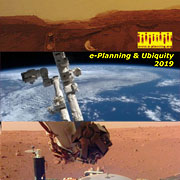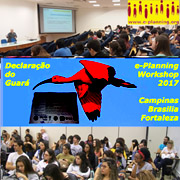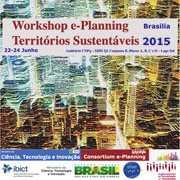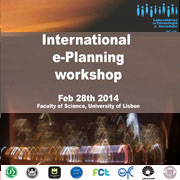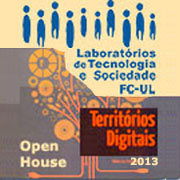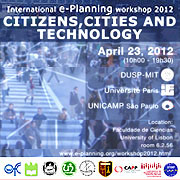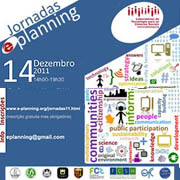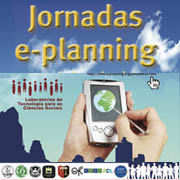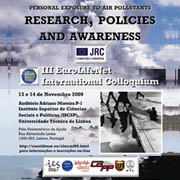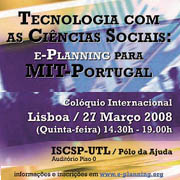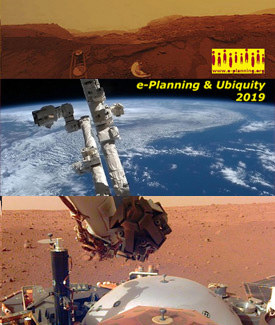
INTERNATIONAL WORKSHOP ONLINE
e-PLANNING & ICT UBIQUITY: SCENARIOS
25/01/2019, 13h30 - 18h30
(FCT-UNL – eLearning Lab)
Objective
To expand participatory dialogues on the theme among researchers, educators, policymakers and the community at large; to identify the key research questions and build a research strategy in this domain.
Format
- Invited participants in two panels will present and debate (1h), followed by 20 minute open discussion. Except for a brief keynote, listed topics are therefore not structured individual presentations, but the main topic contribution from each panel member to the conversation.
- A final joint (plenary) session will map & converge the discussion, identifying raised issues / questions and a follow-up agenda.
- Since the objective is to have a conversation and compile research issues & priorities, to optimize the time available, we invite participants to submit (previous to the meeting if possible, otherwise shortly afterwards) complementing materials, useful to introduce themselves, and their related work. These materials can be multimedia (videos, slides, text), and will be posted on-line on the web, or only shared among participants, according to each contributor specification.
- The session itself will be videorecorded, for research analysis.
Language
A first part of the meeting will be in english (roughly up to 15h), to allow full participation of our “keynoter” and non-portuguese speaking participants. The remaining part will be conducted in portuguese. Materials to be posted can be in any language, although it is recommended an english version, whenever available, in addition to original language, if non-english.
Participation
Participants must register to have access to the meeting, either in person (e-Learning Lab, FCT-UNL, Monte da Caparica Campus), or on-line (through zoom/colibri videoconference link – requires installing a simple plug-in from zoom, free). Sessions will be videotaped; video / images will be posted in this site and / or incorporated in proceedings.
Registration is free, but number of participants is limited to available seats, and limits to simultaneous remote location links. Non-registered persons will not have access to neither the room or a remote connection.
To register, send email to pfa@mit.edu and kpinheiro.projetos@gmail.com.
Program
13h30 Reception & (Zoom) Connection links
13h45 Introductory Remarks
- Pedro Ferraz de Abreu - Coord. ePlanning Lab, e-Planning Consortium
- Karine Pinheiro de Souza – Co-Chair, Organizing Committee
14h – 15h20 – PANEL Technology & Social Studies: Ubiquitous Scenarios
(part 1 – in english / part 2 – in portuguese)
- Prof. Joseph Ferreira, Jr., DUSP, MIT, USA
Planning and Ubiquity Computing at MIT (Keynote)
- Dr. José Magalhães, Deputado da Assembleia da República (Member of Parliament)
CiberLaw Eclipse?
- Prof. Barbara Neves, Melbourne University, Australia
Technological Ubiquity & Elder Inclusion (recorded due to time-zone difference)
- Profs. José Beirão, João Cabral, Graça Moreira, Fac. Arquitectura, Univ. Lisboa (1)
Urban Space, Technology & Participation
- Dra. Margarida Campolargo, ePlanning PhD Student at Univ. Aveiro.
e-Planning approach to Smart Cities
- Dra Aurore Bertrand, fmr. Institut Français d'Urbanisme, UNiv. Paris, France ([1])
Challenges & Opportunities of Technology Ubiquity in Urban Space & Practice
- Prof. Pedro Ferraz de Abreu – Univ. de Aveiro, ePlanning Lab, CITIDEP
Ubiquity for Empowerment vs. Ego bubbles & Superficiality; Citizenship vs. Push (in)to Consumer roles
- Prof. Muriel Oliveira Oliveira, Pro-Reitoria FCA-UNICAMP, Brasil; ePlanning Lab, CITIDEP
The role of Extension activities in the Construction of the Collective Knowledge
- Prof. Jose Fidalgo, ISEC; Univ. Católica-CESOP; ePlanning Lab
Implementation and Measure of Sustainability at the Local & City level
- Dra Tatiane Vietro, e-Planning PhD Student, CTI Renato Archer, Brasil
Live Laboratory of Social Technology
- Prof. Rafael Silva – Univ.F. Ceará, Brasil, ePlanning Lab, Phd Student at Univ. Coimbra.
Old and ubiquitous cities of the panotypes to social engagements
15h20: BREAK 10MIN
15h30 – 16h50 - PANEL Actions & Educational Projects in Ubiquitous Scenarios
- Dra. Karine Pinheiro de Souza – Secr. Educação Ceará, Brasil ; e-Planning Postdoc at Univ. de Aveiro
Ubiquitous scenarios and e-planning new paths paths - social, cultural and educational perspectives
- Prof. Daniela Melaré, Universidade Aberta de Portugal
O CODIRE – formative experiencies at UAB/Portugal.
- Dra. Amanda Franco, Postdoc at Univ. de Aveiro
Critical thinking and interdisciplinarity
- Dra. Tania Dias Fonseca, LTEC- Learning and Teaching Enhancement Centre, Kingston University, UK (1)
Ubiquity & Learning - Evaluation, Learning analytics, Market pressure in Education
- Prof. Arnaud Junior, U.Estadual do Ceará –(UECE), Brasil
Formative panorama and speeches of students specializing in digital technologies.
- Dra. Alexandra Okada, Open University UK
Responsability and Innovation in Research – RRI
- Dr. Jef Bittencourt, ePlanning PhD student, Univ. de Aveiro
e-Planning research issues
-presentation in Pitch form
16h50: BREAK 10MIN
17h00 – 18h30: Convergence & Mapping
New participatory scenarios for responsibility and innovation in research.
Moderation – Karine Pinheiro de Souza –ePlanning
Etapa 1 - A lousa digital – Trello
Etapa 2 ( reflexão) – CmapTools
18:30h – Closing Remarks.
The event will be online-centered (webconference)
THE METHOD
This study helps us to clarify the epistemological basis of the new ubiquitous scenarios, as well as studies on mobility, online presence and continuous participation, inaugurating a new form of coexistence and complementarities that is the hallmark of these new learning scenarios, drivers collaborative and cooperative work.
In each panel (lasts an hour) each participant has an average of 7 min to give their input / experience; and after each block of presentation we will have an synthesis.
The whole process of mediation has the objective of promoting the convergence of knowledge.
While the presentations take place, we will have support from e-planning researchers who would be sharing categories from each of the tables to converge knowledge about the challenges of ubiquitous scenarios in new ways of doing science.
It is essential that each participant is aware of the limited time available, and do not overextend interventions, since the challenge of the workshop is to encourage the participation of all and to enable everyone to listen to each one of the participants, so that they feel true belonging to the ubiquitous scenario.
We can always refer to complementary materials made available on-line, and, above all, we can program to continue this conversation and discussion with follow-up meetings. This is the beginning of a collaborative process, not the end of one.
Our methodology is based on the principle of dialogism, interdisciplinary views, complex thinking and problem life cycle.
for more info:





